THIRD ANNOUNCEMENT
SECOND BRAZILIAN WORKSHOP OF THE GAME THEORY SOCIETY IN HONOR OF JOHN NASH, on the occasion of the 60th anniversary of the Nash equilibrium.
DATE: 07/29/2010 – 08/04/2010
UNIVERSITY OF SÃO PAULO – DEPARTMENT OF ECONOMICS – SÃO PAULO-SP– BRAZIL
Deadline for submission: March 15.
www.usp.br/econ/bwgt2010
www.gametheorysociety.org/conferences/#29July2010
The 2nd Brazilian Workshop of the Game Theory Society in honor of John Nash, on the occasion of the 60th anniversary of the Nash equilibrium, was chosen to be, by FAPESP, – The State of São Paulo Research Foundation - the 1st São Paulo School of Advanced Sciences in Game Theory. Because of this, we received extra funds to cover the travel and hotel expenses of graduate students and/or junior PhDs, to be selected by a committee, among those ones who want to attend the mini-courses and to participate in the whole workshop. The funds will benefit 50 Brazilian and 50 foreign participants. We will also be able to partially support regular speakers, who will have their papers accepted for presentation and will participate in the whole event.
More specifically, two kinds of financial aid will be provided:
S1. Financial support for travel plus R$1360,00, a little more than eight nights in the Hotel L’Opera in single room. ( see the list of official hotels for the event in our site).
S2. R$640,00, equivalent to eight nights in the Hotel L’Opera in double room ( see the list of official hotels for the event in our site).
In order to apply for S1 the candidate must be a graduate student or a young researcher (who got his/her PhD in the last three years). It is required to register and to send the following documents by e-mail to bwgt2010@usp.br, until March 15:
1.Justification, written by the candidate, for his/her application, specifying the mini-courses he/she wants to attend, as well as the importance of these courses in his/her research project and his/her affiliation.
The candidate must participate in the whole event and must attend 4 mini-courses among the six ones offered: 1 -Non-cooperative games, 2 -Introduction to Auctions, 3 - Experimental Economics or Game theory and Democracy and 4- Networks or Stochastic games: Algorithms and Existence Theorems.
2.Recommendation letter written by the candidate’s advisor, with the information about when the candidate plans to finish the graduate course, if the candidate is a student. Otherwise, the recommendation letter should be written by a Professor and should contain the information about the year the candidate finished the graduate course.
3.A brief description of one page long of the research project that is being developed by the candidate, specifying in which topic(s) of game theory the project fits. This document must be signed by the candidate and by whom writes the recommendation letter.
4.Curriculum vitae emphasizing the scientific production, if any.
5.Up dated transcript of graduate courses.
A group of candidates may be invited to present and discuss his/her research project in the poster session. Independently, any candidate may submit a paper for presentation in a regular session.
The kind S2 of financial support will be provided to a limited number of regular speakers, among those ones who will have their papers accepted for presentation and will participate in the whole event.
All selected candidates will receive an e-mail from us by April 15. By the end of the workshop every participant will be asked to answer, by written, some questions aiming to provide us with his/her evaluation of the event.
MARILDA SOTOMAYOR
SCIENTIFIC ORGANIZER
DEPARTMENT OF ECONOMICS, UNIVERSITY OF SÃO PAULO/SP, BRAZIL
INVITED SPEAKERS:
John Nash (Nobel Prize in Economics of 1994)
Robert Aumann (Nobel Prize in Economics of 2005)
Roger Myerson (Nobel Prize in Economics of 2007)
Eric Maskin (Nobel Prize in Economics of 2007)
A. Araujo, IMPA e FGV/RJ,BR G. De Clippel, Brown Univ., USA
G. Demange, Paris School of Econ., FR J. Duggan, Univ. of Rochester, USA
P. Dubey, SUNY at Stony Brook, USA O. Gossner, London School of Econ, UK
S. Hart, Hebrew Univ. of Jerusalem, IL O. Hudry, ENS des Télécon., FR
P. Reny, Univ. of Chicago, USA M. Nunez, Univ. Barcelona, Sp
F. Page, Univ. of Alabama, USA H. Sabourian, Univ. of Cambridge, UK
A. Sandroni, Univ. of Pennsilvania, USA W. Sandholm, Univ. of Wisconsin, USA
W. Thomson, Univ. of Rochester, USA F. Valenciano, Univ. Del País Vasco, Spain
A. Urbano, Univ. de Valencia, Sp M. Wooders, Vanderbilt Univ., USA
MINI-COURSES
Non-Cooperative Games, S. Zamir (Hebrew Univ.), Auction Theory, P. Milgrom (Univ. Stanford), Experimental Economics, J. Wooders, (Univ. of Arizona),
Game Theory and Democracy, S. Brams, (New York Univ.),
Networks, M. Jackson (Univ. Stanford), Stochastic Games: Algorithms and Existence Theorems, T.Raghavan (Univ. Chicago).
Assinar:
Postar comentários (Atom)





Nenhum comentário:
Postar um comentário